Now in its twelfth year, Class 46 is dedicated to European trade mark law and practice. This weblog is written by a team of enthusiasts who want to spread the word and share their thoughts with others.
Click here subscribe for free.
Who we all are...
MARQUES Annual Conference 2024, Stockholm: parts 1 and 2
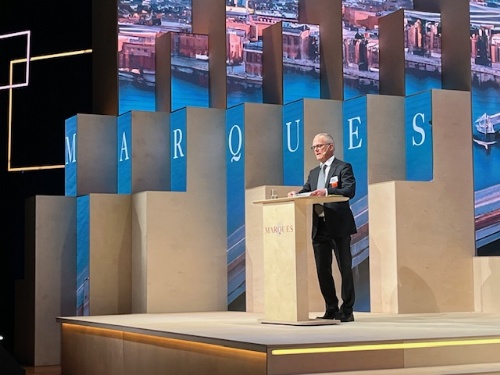 |
| Magnus Ahlgren, PRV |
MARQUES Chair Antony Douglass, of Specsavers Optical Group Limited, Guernsey, this morning welcomed nearly 1,000 delegates to Stockholm for this year’s Annual Conference.
In a speech peppered with references to Abba songs, IKEA and cinnamon buns, Antony pointed out that the theatre stage is made entirely of recycled wood, which will be recycled again when it is taken down.
In his opening address, Magnus Ahlgren, Chief Legal Counsel, Head of Department at PRV, the Swedish Intellectual Property Office, also addressed IP and sustainability.
He focused on AI and its potential impact on trade mark law. “Trade marks and trade mark law have been relatively absent in the debate. But this does not mean AI will not have an impact on AI law. On the contrary,” he said.
Quoting David Bowie, he said the interplay between users and providers on the internet and social media is “highly relevant for trade mark law” thanks especially to the rise of influencers and deepfakes.
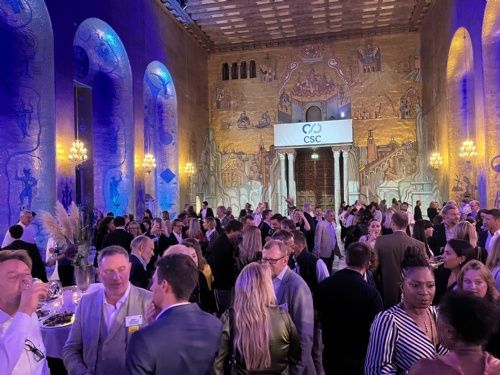 |
| Welcome Reception at Stockholm City Hall on Tuesday night |
He pointed out that: “We as consumers provide tech giants with tremendous amounts of data” on our habits, life choices, political stances and more. This enables platforms to experiment with how they promote and sell goods and services. “With general purpose AI the boundaries are going to become increasingly blurred … leaving you more in the open,” he said.
For example, intelligent fridges could cater for birthdays, dates and diets. What role will trade mark law play then? How relevant are the Google AdWords judgments of the CJEU concerning third-party-use? “They are relevant because the damage to the core function of a trade mark is the same,” said Magnus.
The EU AI Act addresses these issues to some extent, but trade mark owners need to think about how to ensure their marks remain distinctive in the age of AI, he concluded: “We have a duty to think of trade marks in a long-term perspective.”
How to win in the court of public opinion
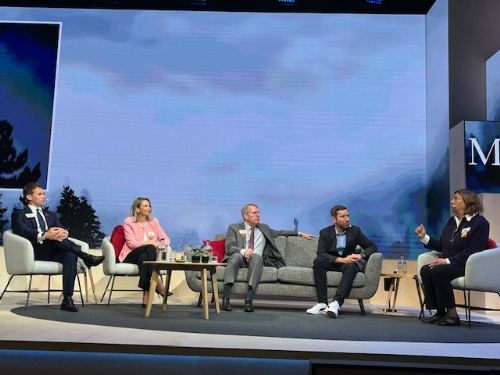 |
| Panel 1 |
Introducing the first panel session, “You can find your way in the court of public opinion”, moderator Lisa Pearson, Kilpatrick Townsend & Stockton LLP, USA and a member of MARQUES Dispute Resolution Team, described the “wake-up call” when IP litigation attracts press interest. “Now we’re in the 24-7 news cycle, brands are the new celebrities and the news cycle is ravenous for content,” she said.
Rob Mindell, of FTI Consulting, UK, a public relations specialist, described the nature of the news cycle and the reputational impact of IP litigation and asked: how does Goliath beat David in the court of public opinion?
Rob emphasised the importance of brands putting out their views or corrections to stories in time for newspaper first editions in the evening. He distinguished between first-order effect – the bad news – and second-order effect, such as customer and investor comments and complaints. “Second-order effects affect reputation,” he said.
Rob said there are three ways that Goliath can win against David by winning the hearts and minds of consumers: by showing the economic value of a premium brand; protecting consumer welfare interests and trust; and treating the small business (“David”) well.
He concluded with a video by KFC concerning its chickenstock image bank and campaign against copycats (“You can steal our images, but you will never steal our taste”). “It’s high risk, but so far it’s working,” said Rob.
David Gooder, Commissioner for Trademarks of the US Patent and Trademark Office, USA and former head of trade marks at Jack Daniel’s, spoke about a case where a cease-and-desist letter went viral for good reasons.
He discussed using core brand values to mitigate reputational risk in trade mark enforcement, based on developing an enforcement philosophy, incorporating the key values and applying the philosophy in practice.
“Who are we as a brand? What do we stand for? That is really fundamental,” said David, noting that an aggressive litigation strategy can be at odds with brand values. The next step is “to articulate what the harm is”. If you can’t do that, you need to step back and ask: why are we taking action here? Finally, ask: what is a win?
When Jack Daniel’s noticed a pattern in infringements, it adopted a policy and two over-arching values: (1) find ways to say “thank you” appropriately and creatively and (2) be careful picking fights with people “who buy ink by the barrel” – which today is anyone who is on social media.
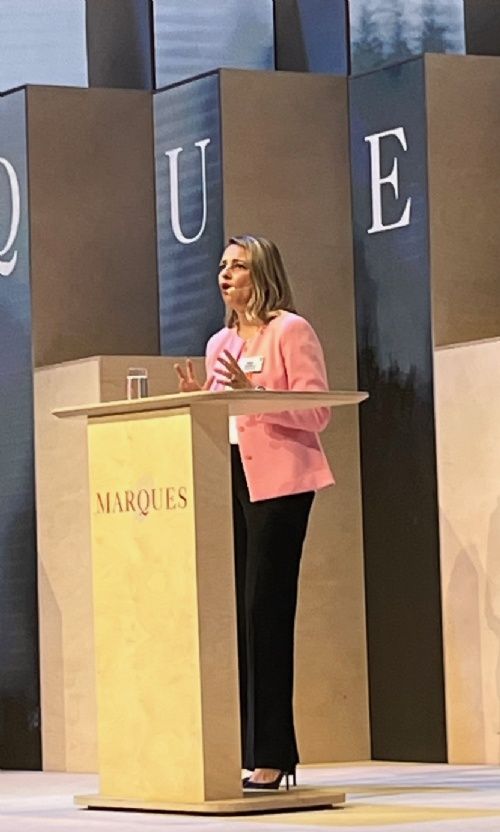 |
| Irina Beck, Nestlé |
Jack Daniel’s had a persistent problem with take-offs of its famous brand name and logo. When a local author published a book with a cover based on the Jack Daniel’s brand, the company sent a polite letter requesting it be changed. This led to enormous social media coverage and 100% positive feedback across 80 countries. The book also sold well, with a new cover.
Today, “Jack Daniel’s polite cease and desist” continues to be a popular search term and the company still benefits from the positive coverage.
In her presentation, Irina Beck, legal counsel at Nestlé, Switzerland, spoke about striking a balance between “legal gain and reputational risk”. Nestlé always carries out an early case assessment (ECA) and asks: how far would we go?
The ECA is a process to get ahead of the game, said Irina, based on stakeholder management, global presence, business unit coordination, cultural differences, legal and regulatory compliance and online media reaction. The ECA includes an assessment of reputational risk. But, she said, “sometimes the case can change … sometimes something can go wrong”.
Irina stressed the importance of setting boundaries based on business and legal interests, public perception and the opponent profile and shared examples of online enforcement of the NESPRESSO brand in South Korea and the MILO brand in Australia.
The cases showed the importance of “being careful who’s behind the scene” and paying attention to media coverage, she said. Her takeaways were: implement a proactive litigation management to identify and minimise reputational risks, proactively safeguard IP rights and keep a pulse on public opinion and build relationships with communication stakeholders.
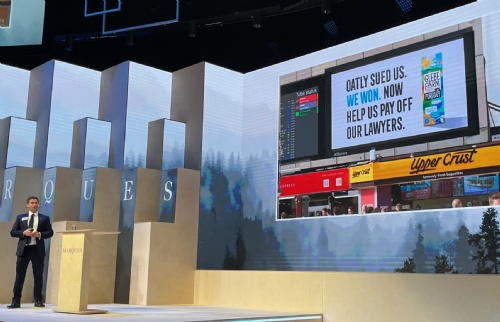 |
| Jeremy Blum, Bristows |
Jeremy Blum, Bristows, UK, a member of the MARQUES Dispute Resolution Team, talked about a case he had been involved in that showed the risks and rewards of litigation: Oatly v Glebe Farm (the PURE OATY case). He described it as a tale of two social media feeds.
“The mood music in the media immediately positioned it as David v Goliath,” said Jeremy. For example, a petition set up by two members of the public got 131,528 signatures to overturn an injunction that didn’t exist. “It doesn’t matter to the public what the legal accuracies or niceties are,” he added.
But, while Oatly was losing support, Glebe Farms gained unexpected popularity and took out advertising to capitalise on it. “If you want to win public opinion, just attack lawyers,” said Jeremy.
If you’re a David, he said, lean in to it: people love an underdog. Communicate with a sense of fun and do it in a measured tone; don’t be a victim or get angry. “The public will do it for you,” he said. “Don’t say it’s nothing personal; of course it’s personal. That sounds like you don’t care. Don’t justify your position on legal points but on fairness. Beware of how you are perceived and always act in the interests of the business."
New challenges for in-house counsel
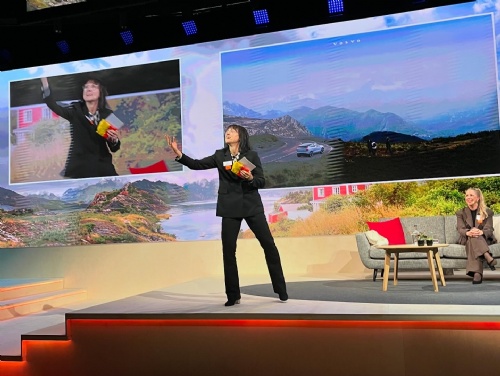 |
| Lisa Selar, Volvo Cars |
Similar themes were picked up in session 2 of the Conference, “You can work outside your comfort zone” which featured Jennifer Godorn Wessman, Mölnlycke Health Care, Sweden and Lisa Selar, Volvo Cars, Sweden in a discussion moderated by Arthur Artinian, K & L Gates LLP, UK, who is a member of the MARQUES Council and Vice-Chair of the Brands & Marketing Team.
Arthur stressed that trade mark counsel increasingly have to deal with new issues, including handling marketing claims, sponsorship agreements and environmental claims as well as PR issues.
The panellists brought different perspectives. Jennifer is her company’s first full-time trade mark counsel and has to navigate the complex world of healthcare regulation. She said her approach is: “Identify the Crown Jewels, follow the money and start from there.”
By contrast, Lisa has been with Volvo for 20 years and the brand is very well known, and has even collaborated for a co-branded candy (which Lisa distributed to the audience). One of the challenges she faces is that AB Volvo and Volvo Cars are separate companies. The trade marks belong to Volvo Trademark Holding and are licensed to both companies who must comply with certain rules.
Volvo Cars also has its own brands devised by the Nomenclature Committee and there is a trend to be more descriptive. “That’s a challenge from a trade mark point of view,” said Lisa. “We have to explain when we cannot claim exclusivity,” she added.
“We take a slightly different approach,” said Jennifer. “My top advice is to add unique elements to packaging that we can enforce.” Mölnlycke also uses brand extensions such as Mepilex Up with the ad campaign “Things are looking Up.”
The company has to monitor claims including by third parties very carefully due to healthcare regulations. In one case, an influencer made an unauthorised off-label claim for the product. The post was very popular but the company had to ask her to take it down because it was misleading.
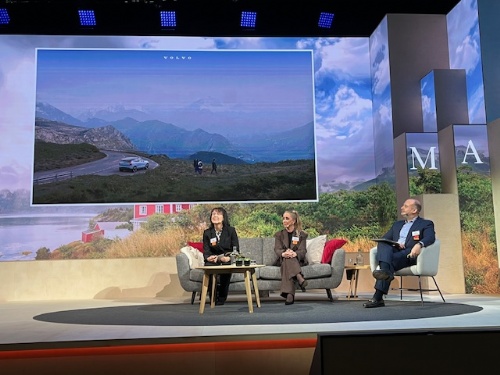 |
| Panel 2 |
At Volvo, commercials are also now thoroughly reviewed by safety, sustainability and legal teams to ensure they do not make unwarranted claims, said Lisa. Claims are therefore more nuanced and qualified.
Other challenges counsel have to deal with concern sponsorship and CSR, which many companies are increasing to promote sustainability. “As a trade mark attorney, you may get a donations agreement on your desk. We cannot give a trademark licence in the agreement as that would be a gift in kind,” said Jennifer. Other details she has to monitor are ensuring products are properly disposed of and traceability.
Lisa said Volvo has reduced sponsorship in recent years but has launched Volvo World in Gothenburg and the Volvo For Life Fund focused on sustainability and its partner organisations.
Both speakers highlighted the challenges of complying with growing environmental regulation in the EU. Picking up on a theme from the first panel, Jennifer showed a video made with an artist which showed what Mölnlycke is doing to cut surgical waste. “It’s important in promoting values rather than features,” she explained.
Asked by Arthur for one piece of advice for in-house counsel, Jennifer said: “You have to be a business strategist as much as a lawyer.” Lisa agreed, adding: “There are always risks. It’s important to explain them in an easy way.”
The MARQUES Annual Conference is taking place until Friday. More reports will be posted during this week.
Photos by MARQUES staff
Posted by: Blog Administrator @ 16.46Tags: Annual Conference, Stockholm, Antony Douglass, ,


 Sharing on Social Media? Use the link below...
Sharing on Social Media? Use the link below...Perm-A-Link: https://www.marques.org/blogs/class46?XID=BHA5295

